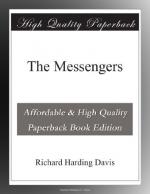“When one thinks of being married,” said Polly Kirkland gently, “it isn’t a question of the man you can live with, but the man you can’t live without. And I am sorry, but I’ve not found that man.”
“I suppose,” returned Ainsley gloomily, “that my not being able to live without you doesn’t affect the question in the least?”
“You have lived without me,” Miss Kirkland pointed out reproachfully, “for thirty years.”
“Lived!” almost shouted Ainsley. “Do you call that living? What was I before I met you? I was an ignorant beast of the field. I knew as much about living as one of the cows on my farm. I could sleep twelve hours at a stretch, or, if I was in New York, I never slept. I was a Day and Night Bank of health and happiness, a great, big, useless puppy. And now I can’t sleep, can’t eat, can’t think—except of you. I dream about you all night, think about you all day, go through the woods calling your name, cutting your initials in tree trunks, doing all the fool things a man does when he’s in love, and I am the most miserable man in the world—and the happiest!”
He finally succeeded in making Miss Kirkland so miserable also that she decided to run away. Friends had planned to spend the early spring on the Nile and were eager that she should accompany them. To her the separation seemed to offer an excellent method of discovering whether or not Ainsley was the man she could not “live without.”
Ainsley saw in it only an act of torture, devised with devilish cruelty.
“What will happen to me,” he announced firmly, “is that I will plain die! As long as I can see you, as long as I have the chance to try and make you understand that no one can possibly love you as I do, and as long as I know I am worrying you to death, and no one else is, I still hope. I’ve no right to hope, still I do. And that one little chance keeps me alive. But Egypt! If you escape to Egypt, what hold will I have on you? You might as well be in the moon. Can you imagine me writing love-letters to a woman in the moon? Can I send American Beauty roses to the ruins of Karnak? Here I can telephone you; not that I ever have anything to say that you want to hear, but because I want to listen to your voice, and to have you ask, ‘Oh! is that you?’ as though you were glad it was me. But Egypt! Can I call up Egypt on the long-distance? If you leave me now, you’ll leave me forever, for I’ll drown myself in Lone Lake.”




